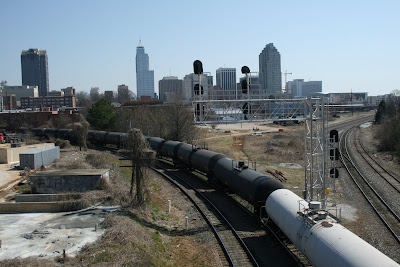
Picture this: a seamless, modern, and efficient transit system linking highways, public transportation, freight, passenger rail, and coastal ports. That’s the vision of legislation introduced this session of the North Carolina General Assembly. Legislation in both the House and Senate starts with local funding options for transit and has attracted broad support from business, economic development, and environmental interest groups.
In North Carolina, transportation-related global warming emissions are the second largest source of emissions behind electricity generation. Passage of "Congestion Relief/Intermodal Transport Fund" (HB 148 and SB 151) has a reasonable shot at success this session, primarily because, as opposed to prior legislation, these bills have a more statewide outlook.
There are a lot of regional considerations, especially here in Raleigh, where project stakeholders continuously debate whether opening up the "Wye" to "light" rail (the kind of train that grabs power from an overhead line) is the right way to go, especially if further plans to connect Charlotte and Raleigh via high-speed trains are to move forward (high-speed trains need long, straight tracks to slow down, and probably wouldn't mesh easily with light-rail trains).
Despite such considerations, there is a growing consensus in the capitol that construction of more efficient public transit systems - like the LYNX in Charlotte - will a) move people more efficiently in one of the fastest growing states in the country, and b) create all kinds of jobs.
What's the hang up? Some groups are balking at what exactly "local funding options" means. In most cases, the phrase means a .5 cent increase in sales tax. In light of the huge economic downturn and state budget issues, state legislators on both sides of the aisle and city and county officials are wary to raise the sales tax for transit options that might appear years down the line. But funding options other than the sales tax hike probably wouldn't generate enough revenue.
Since the 1920’s, North Carolina has been known as the “Good Roads State.” It can and should become the “Good Transportation State” by increasing mobility, decreasing congestion and offering a robust transportation network to commuters.
In North Carolina, transportation-related global warming emissions are the second largest source of emissions behind electricity generation. Passage of "Congestion Relief/Intermodal Transport Fund" (HB 148 and SB 151) has a reasonable shot at success this session, primarily because, as opposed to prior legislation, these bills have a more statewide outlook.
There are a lot of regional considerations, especially here in Raleigh, where project stakeholders continuously debate whether opening up the "Wye" to "light" rail (the kind of train that grabs power from an overhead line) is the right way to go, especially if further plans to connect Charlotte and Raleigh via high-speed trains are to move forward (high-speed trains need long, straight tracks to slow down, and probably wouldn't mesh easily with light-rail trains).
Despite such considerations, there is a growing consensus in the capitol that construction of more efficient public transit systems - like the LYNX in Charlotte - will a) move people more efficiently in one of the fastest growing states in the country, and b) create all kinds of jobs.
What's the hang up? Some groups are balking at what exactly "local funding options" means. In most cases, the phrase means a .5 cent increase in sales tax. In light of the huge economic downturn and state budget issues, state legislators on both sides of the aisle and city and county officials are wary to raise the sales tax for transit options that might appear years down the line. But funding options other than the sales tax hike probably wouldn't generate enough revenue.
Since the 1920’s, North Carolina has been known as the “Good Roads State.” It can and should become the “Good Transportation State” by increasing mobility, decreasing congestion and offering a robust transportation network to commuters.

Good post. It is imperative that there be a dedicated source of funding for rail and transit improvements. Some progressives are concerned that increasing the sales tax is regressive, hitting lower-income people the hardest. I would like to see various funding alternatives studied, but we need to decide on one this year so we can start raising money and start making improvements.
ReplyDeleteThanks, Malcolm. I've been told - by other progressives who agree that a sales tax hike is regressive, to a degree - that there simply isn't a viable alternative to acquire the funds needed for such a project. The alternatives that have been proposed here in NC - a gas tax, for example - are more regressive than a sales tax increase.
ReplyDeleteHere's a link to a report on alternatives:
http://www.ncjustice.org/assets/library/1208_btcbrief16june08salestx.pdf
But I agree. The time is now to move forward on this.